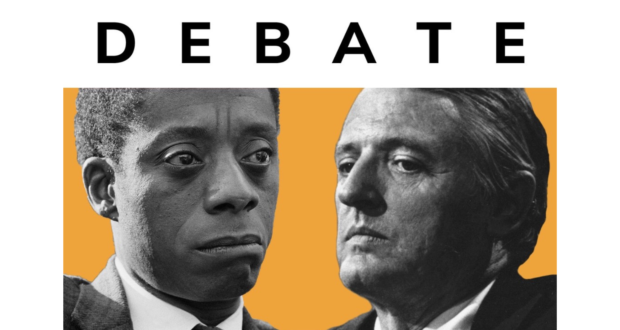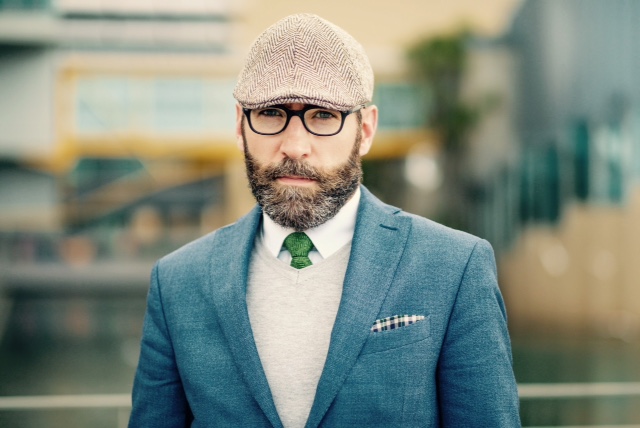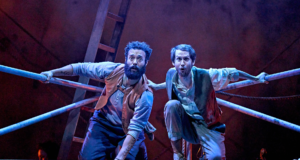Christopher McElroen on adapting Debate – Baldwin vs Buckley at Stone Nest
Christopher McElroen is the Artistic Director of the american vicarious, a not-for-profit organisation producing creative work that examines America’s ideals and realities; ways in which its people are divided or united. We took a moment to ask him about his upcoming adaptation of Debate – Baldwin vs Buckley which runs at Stone Nest from 15 March.
Hi Christopher. This is a staged dramatisation of a TV debate that took place in 1965. Can you tell us about the topic: Is the American Dream at the expense of the American Negro?
My understanding about the motion proposed at Cambridge Union on February 18, 1965, “the American dream is at the expense of the American Negro”, is that it was specifically crafted to invite Baldwin and Buckley to push beyond their well-documented divergent positions on the civil rights movement.
This detailed motion encouraged them to discuss the fundamental questions about the relationship between the ideals of the American dream – freedom, equality, and opportunity for all – and the reality of the American dream, which Baldwin had called a “racial nightmare.” Buckley, on the other hand, considered himself to be a guardian of the ideals at the core of the American dream.
The motion set the stage for an epic and enduring debate that reached well beyond the Civil Rights Movement and cut to the heart of the American experience, which is why it still resonates today.
How does this production differ from, say, Best of Enemies, recently on in the West End, which covers the William F Buckley Jr TV debates with Gore Vidal?
While I am familiar with the contentious history of Buckley and Vidal, I have not seen or read Best of Enemies. So, it is hard to comment on that play and its current production. What I can say about Debate: Baldwin vs. Buckley is that we don’t seek to make the material theatrical. Simply, we place the words of Baldwin and Buckley in the mouths of contemporary artists 58 years later. The theatricality is created by sharing those words in an intimate setting. Sadly, they resonate as if spoken for the first time today.
the american vicarious makes work described as “specifically ambiguous”. Can you tell us about your intention with this? How might it affect your – and perhaps the audience’s – response to the source material you are presenting?
Ambiguity is the quality of being open to more than one interpretation. We seem to have lost that openness in our public discourse. If you and I were to agree 80% of the time, we might well label each other enemies – thus negating the common ground we share, which can ultimately be used to find consensus on the remaining 20%.
The narrow-minded tribalism in our politics and daily lives has undermined a cornerstone of a civilized society – claiming and caring for one’s identity, needs, and beliefs without degrading someone else’s.
In the debate, Baldwin called for a moral revolution in race relations. Buckley was unabashed in his elitism and implicit commitment to the status quo. Yet, both speakers expressed divergent views with decorum and civility. Both claimed their identity, their needs, and their beliefs while doing so without degrading each other in the process.
One of our hopes in staging this work is that a contemporary audience will remain open to both sides of the debate, because if you do listen, the rebuking of hatred and calling for restructuring social programs to further equity and equality is oddly the common ground shared by both Baldwin and Buckley.
This show was originally staged in 2020 Off Broadway, at the time of race riots in response to the appalling murder of George Floyd. Why did you choose to take this more cerebral approach, when the rest of the world was on fire?
The foundation for Baldwin’s 1965 debate argument was his book ‘The Fire Next Time’. Following the murder of George Floyd, 2020 felt like the “next time” that Baldwin spoke of, and to your point – the United States was on fire. So, I turned to the Cambridge Union debate to artistically participate in this historic moment in US history. Not only did the Baldwin Buckley debate address the racial conflict that was taking place in 2020, but it also contained the lost art of civility in our public discourse, which the United States was again witnessing in the 2020 Presidential Election. The coupling of those events made it the ideal moment to explore the material and to do so in a way that sparks this dialogue that you and I are sharing today.
Why did the debate originally take place at Cambridge University in England – not the USA? And does that institution still have the same relevance today?
This is an excellent question that I’m not certain I can answer. The US does not have the custom of this form of debate, nor a storied institution like Cambridge Union that encourages meaningful debate – then and now.
My further speculation is that the topic was too close to the nerve to have in the United States. Only three days after the debate, on 21 February 1965, Malcolm X was assassinated in Harlem. In 1963, two years earlier, JFK was assassinated. In 1968, Martin Luther King Jr.
Stone Nest is a fabulously intimate venue. How does it feel to put this work on there?
My US collaborators and I could not ask for better partners than Stone Nest. Inna Schorr, Hannah Myers, and Richard Williamson have been so supportive of the work. Collectively, we are eager to share Debate: Baldwin vs. Buckley with London audiences.
Many thanks to Christopher for taking the time to tell us about this fascinating piece of work
Debate – Baldwin vs Buckley runs at Stone Nest from 15 March to 8 April. Further information and bookings can be found here.
 Everything Theatre Reviews, interviews and news for theatre lovers, London and beyond
Everything Theatre Reviews, interviews and news for theatre lovers, London and beyond





